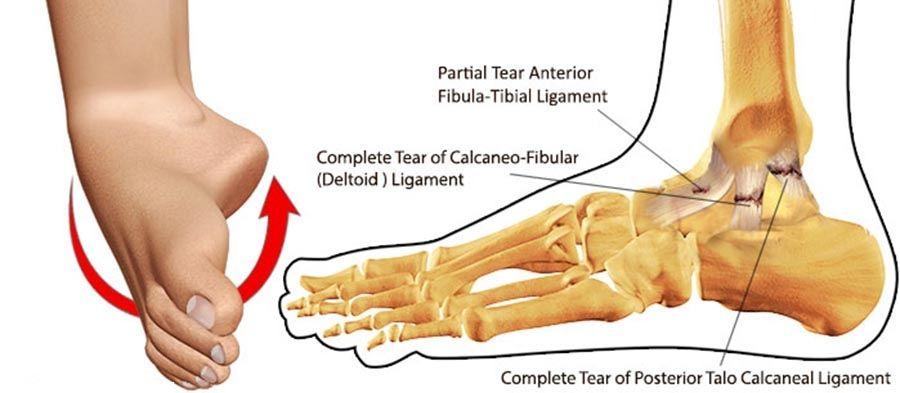As the player is jumping with both feet off the ground, and at times landing off balance with twisting action it causes injury to the ankle.
Although the ankle is flexible enough to permit a wide range of motion, and strong enough to bear the weight of the entire body, it can still be injured. In today’s society with more people involved in many sports and aerobic activities, ankle injuries are becoming increasingly common.
Ankle sprains are the most common acute injury that develops from sudden blows or twists. These sprains are most likely to affect the outside (lateral) ligaments. This happens when the foot turns under the leg, causing a stretching effect to the ligaments to a point where they may rupture or tear. Depending upon the amount of ligament tearing, a sprain can either be mild, moderate of severe. Some mild sprains may allow one to return to their respective sport in two or three days. The seriousness of a moderate or severe ankle sprain should not be underestimated. Improper treatment may result in a chronically unstable ankle that will be prone to repeated injury, resulting in limitation in sport activities, which then can lead to arthritis in the ankle joint.
High-ankle sprains keep the athletes out for longer periods of time, as the injury involves a set of ligaments above the ankle joint. It is the high level of quick cuts and turns which cause instability of the ankle. The higher level of above the ankle injury are more difficult to recognize as they actually demonstrate less bruising and swelling. The athlete will experience pain radiating up the leg when in motion.
A mild sprain occurs when there is minimal force with only slight stretching or tearing of the ligaments. Pain and swelling are minimal, walking is generally possible. Treatment should include icing the ankle as soon as possible for 15-to-25 minutes and applying a compression wrap. The ankle should be elevated as often as possible.
A moderate sprain occurs when ligaments are partially torn. Pain, swelling and bruising are greater and walking may be difficult. The initial treatment is the same as for a mild sprain. Moderate sprains require increased protection, such as soft cast for protection of the injured ligaments, while x-rays should be taken to rule out any bone damage.
In a severe sprain, ligaments can be completely torn. Pain and swelling are immediate and obvious. Bruising can appear on both sides of the ankle and bones may be chipped or broken. The initial treatment is RICE—rest, ice, compression, elevation. Again, x-rays should be taken. A cast may be required for four-to-six weeks.
In prevention of further injury to the area, one should embark upon a rehabilitation program to restore strength and flexibility to the lower leg and ankle as soon as possible. A form of support, such as tape or elastic wrap, should be maintained for six to eight weeks. If it becomes chronic use Orthotics.
Dr. Robert F. Weiss is a podiatrist specializing in foot and ankle surgery, Weiss is a veteran of 35 Marathons and has a practice in Darien, affiliated with Stamford Hospital

